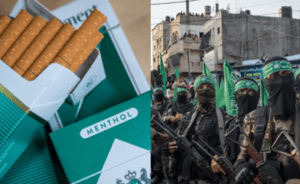Understatement of the year: “The FDA noted in its proposed rule banning menthol cigarettes that the “removal of menthol cigarettes from the marketplace could result in some people seeking menthol cigarettes through the illicit trade market.”
It is estimated that 43% of adults who smoke, smoke menthol cigarettes – an extremely large market alienated by state and local government cigarette bans.
 Since this movement to ban flavored tobacco started, cigarette smuggling and other illegal sales have sky rocketed. It was only a matter of time before terrorist organizations like Hezbollah and major drug cartels realized the opportunity available to supply the market demand for menthol cigarettes.
Since this movement to ban flavored tobacco started, cigarette smuggling and other illegal sales have sky rocketed. It was only a matter of time before terrorist organizations like Hezbollah and major drug cartels realized the opportunity available to supply the market demand for menthol cigarettes.
You can read more about the dangerous black market created by state’s banning flavored cigarettes and the relationship between those bans and the black-market’s funding of terrorist organizations here or keep reading below.
How Biden’s Menthol Cigarette Ban Could Line Terrorists’ Pockets
Proposal would create booming black market for Hamas and Hezbollah, Sen. Cotton warns
By Adam Kredo
Free Beacon
The Biden administration’s bid to ban menthol cigarettes will open a lucrative black-market trade, bringing in millions of dollars for terrorist organizations, including Iran-backed groups like Hamas and Hezbollah, according to a Republican senator.
Since May 2022, the Biden administration has been championing a proposal that will eliminate menthol-flavored cigarettes from American stores. Around 40 percent of adult smokers prefer mentholated cigarettes, and they are particularly popular with black Americans, according to the American Lung Association.
With the menthol market still booming, the Food and Drug Administration’s efforts to enact an outright ban will likely create a massive black market for Mexican cartels and a host of terror groups known to work alongside them, such as al Qaeda, Hamas, and Hezbollah, according to Sen. Tom Cotton (R., Ark.), who sent a letter on Monday to multiple federal agencies seeking information on how they plan to combat the potential for terrorism financing.
“The FDA’s proposed rule to ban menthol cigarettes would allow terrorist organizations such as Hezbollah to rake in millions from black market menthol cigarettes and use the profits to finance their terrorist activities, and therefore represents a national security threat to the United States,” Cotton wrote, according to a copy of the letter obtained by the Washington Free Beacon.
Congress determined in 2009 that “Hezbollah, Hamas, al Qaeda, and other terrorist organizations have profited from trafficking in illegal cigarettes or counterfeit cigarette tax stamps.”
“Terrorist organizations, working with cartels, profit from black market cigarettes and use those profits to finance their terrorist activities,” according to Cotton’s letter.
The FDA noted in its proposed rule banning menthol cigarettes that the “removal of menthol cigarettes from the marketplace could result in some people seeking menthol cigarettes through the illicit trade market.”
Though the FDA said that cigarette trafficking would be “modest” as a result of the ban, the Obama administration determined in 2015 that cigarette smuggling is “a low risk, high-reward criminal activity; traffickers can make millions, with little risk of detection or harsh punishments.”
This determination, Cotton says, is further proof that a menthol ban would enrich cartels and their terrorist partners, providing them with the funds needed to wage terror attacks across the Middle East, including against Israel, which is fighting a war against Hamas and its Iranian backers.
Cotton wants to know if the FDA consulted with the Justice Department and federal law enforcement agencies before issuing the proposed rule. This could indicate whether the Biden administration is prepared to deal with a new black-market trading in menthol cigarettes.
The senator also wants to know if the Justice Department performed an assessment on the potential impact of a menthol ban on the black-market cigarette trade. It is also unclear if the Justice Department “assessed the potential impact of the proposed menthol cigarette ban on the activities of international terrorist organizations,” according to Cotton’s letter.
House lawmakers on both sides of the aisle have also raised the prospect of terror groups cashing in on the menthol ban.
Reps. Andrew Garbarino (R., N.Y.) and Jared Moskowitz (D., Fla.) urged the FDA to reconsider the rule in November.
“It is well-documented that Hezbollah is a leader in the illicit cigarette trade—not halfway around the world but right here in the Western Hemisphere,” the lawmakers wrote. “There have been cases in which Hezbollah and Hamas cells have smuggled cigarettes into the United States to send the revenue overseas. Given Hezbollah’s established cigarette business and its ties to the Mexican drug cartels, we cannot discount the potential for this FDA-proposed rule to open a massive revenue stream for this Hamas-allied foreign terrorist organization.”